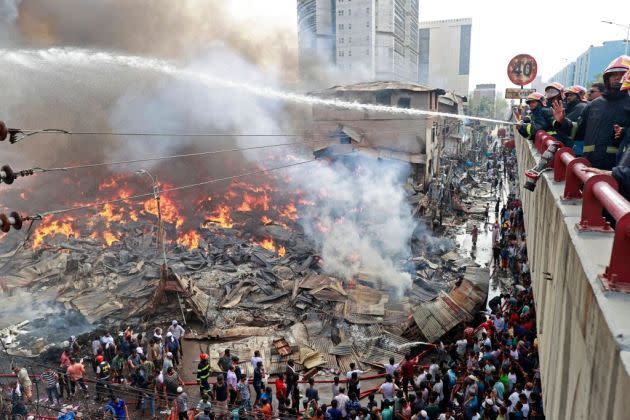Bangladesh Shopping District Fire Incites Calls for Action
- Oops!Something went wrong.Please try again later.

Click here to read the full article.
In the days following a massive fire that destroyed more than 3,000 shops in the Bangabazar shopping area of the capital city of Dhaka, store owners said that the lingering smell of smoldering smoke was still as bitter as their losses.
The blaze, which was reported at 6.10 a.m. local time last Tuesday, is estimated to have caused losses of more than 50 billion taka, or roughly $471.27 million, although actual assessments vary and are still unclear.
“Hundreds of thousands taka worth of apparel products are now just ashes,” said DM Habib, office secretary of Bangabazar Shop Owners Association.
Mohammed Enamur Rahman, minister of state for Relief and Disaster Management said that 5,000 small traders were affected by the fire and that most of the shops in the market were destroyed.
While fire officials confirmed that there were no reports of any casualties, they told Sourcing Journal about the enormity of their task last week, as the fire raged for six hours, with more than 47 firefighting units deployed and 600 firefighters. There was no availability of fire hydrants and the firefighters also had to brave the ire of shop owners who were incensed at the delays in putting out the flames as they helplessly watched their possessions go up in smoke.
The damage is heavy to bear, as extra stocks were on hand for the festival of Eid when consumers are shopping to buy new clothes. Days later, there is both regret and resilience. Regret, that while shop owners tried to salvage whatever they could of the unburnt supplies, looting and stealing was also happening, and the police were not vigilant enough to help. Regret too, that earlier proposals by the government to rebuild the market due to unsafe conditions in 2019 were opposed by the shop owners and put on hold, said Sheikh Fazle Noor Taposh, mayor, Dhaka South City Corporation.
But, as small trader Ahmed Khan pointed out, the spirit of resilience showed through as well, as shop owners who salvaged some of their wares have quickly set up on the pavement to capture what sales they could as Eid-Al-Fitr approaches on April 21.
There have been unexpected gestures of help, as well. The Bidyanondo Foundation has been selling the salvaged, even burnt apparel, with celebrities paying large sums to help out the shop owners. Tahsan Khan, a well-known actor and singer bought a burnt lungi for 100,000 taka, or $942.55. Television star Sabila Nur bought a burnt sari for a similar price. “The businessmen who were affected during fire, probably have daughters like me. They also dream to pursue university degrees. To prioritize their dream and remove their sadness ahead of Eid-ul-Fitr, I bought the sari,” Nur said in a Facebook post. Other celebrities, like actress Bidya Sinha Saha Mim did the same, and traders responded saying that although these amounts would hardly offset their losses, they were touched by the acts of kindness and solidarity.
Other losses include essential documents and licenses. Government officials said that a booth has been set up near the market to help traders get their official papers replaced.
The cause of the fire is still unclear, with both the Fire Services Division and the Dhaka South City Corporation (DSCC) having set up inquiry committees to look into the possible causes.
Such incidents have come up repeatedly in Bangladesh, most notably the Tazreen factory fire in November 2012, and the infamous Rana Plaza disaster in 2013 when a nine-story factory building collapsed. These led to the measures taken by global brands and retailers to help ensure safety including the Alliance for Bangladesh Worker Safety and the Accord on Fire and Building Safety in Bangladesh, that instituted inspections and measures for stemming fires at factories.
However, safety issues related to fires at other locations are a recurring concern.
Last month, more than 2,000 Rohingya refugee shelters in Cox’s bazaar, in South Eastern Bangladesh were destroyed as a fire swept through, leaving charred remains in its wake. In June 2022, a fire at a container depot in the port of Chittagong district killed 47 people and injured more than 450 others; in 2021, more than 50 people lost their lives and many more were injured in a fire at the Shezan juice factory in Narayanganj.
Discussions on fire safety have resurfaced following each incident.
While inquiry committees are set up with regularity, a government official who asked to remain anonymous said that the findings of these committees and their recommendations are not really implemented. The level of accountability, especially in older, more crowded areas, and buildings without enough safety measures is much harder to enforce.
At a press conference in February, director general of Fire Service and Civil Defense, Brigadier General Mohammed Mine Uddin said the Fire Service will launch a joint campaign against the buildings that do not comply with the fire safety laws in the capital. “We will go on a joint campaign with the City Corporation. We will investigate the buildings where fire safety laws are followed or not. And other issues will be monitored by the designated department,” he said.
Meanwhile, traders at Bangabazar are scrambling to handle grief and hostility—as well as take any action they can to see that the burnt remains of the clothes from their market be useful in any form.
